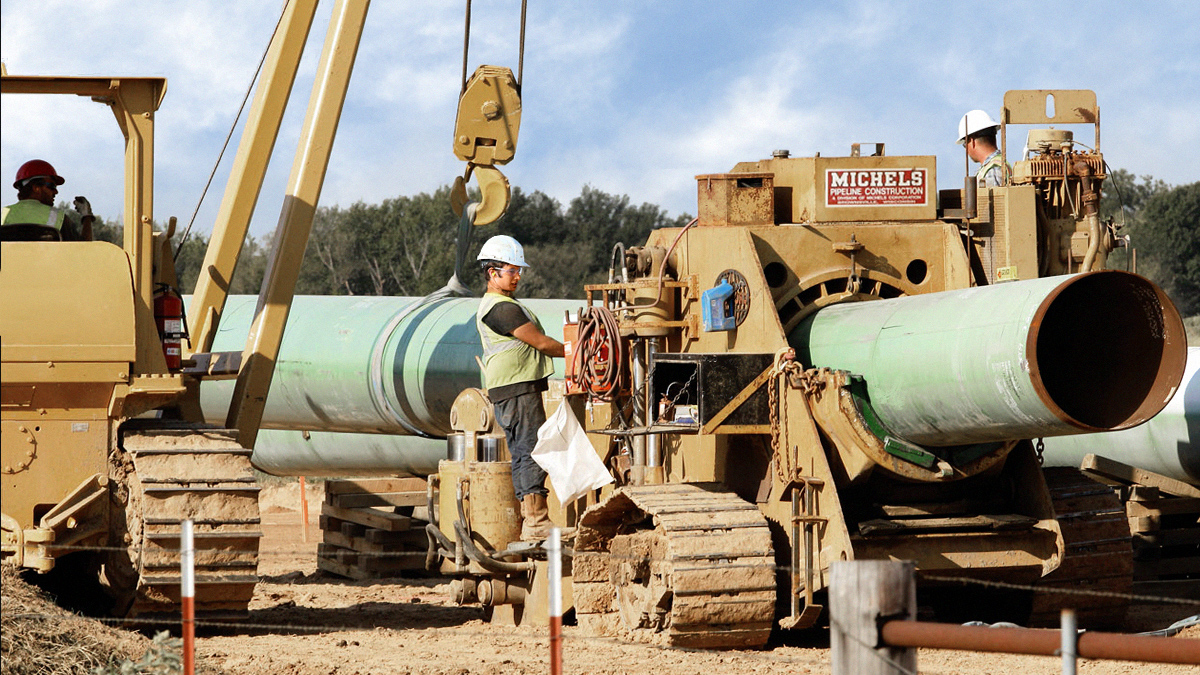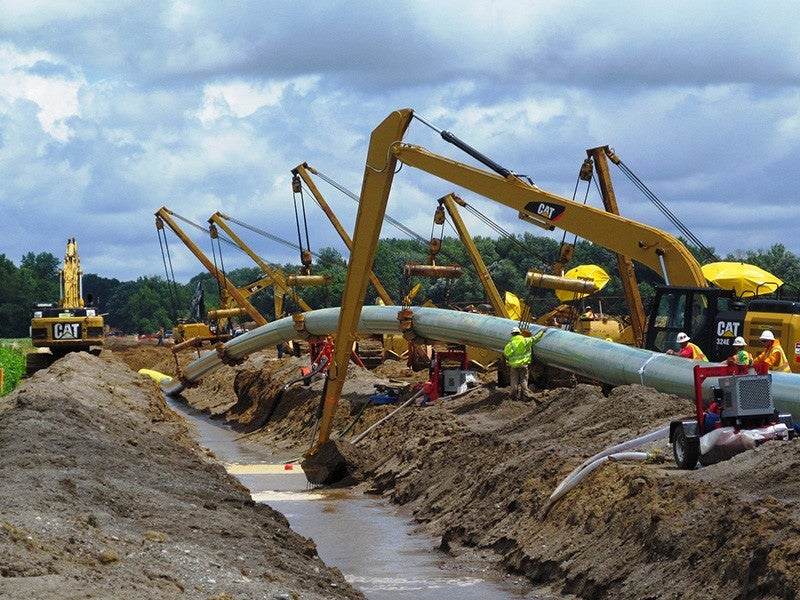Midland oilfield pipeline services: Why sustainability practices are crucial
Wiki Article
Recognizing the Key Attributes of Pipeline Providers and Their Influence On Performance
Pipeline services play an important duty in various markets, affecting functional efficiency considerably. Secret features, such as sophisticated tracking modern technologies and upkeep methods, are important for lessening downtime. Additionally, regulative conformity guarantees safety and security and ecological security. However, the interaction between style, facilities, and financial variables can complicate these procedures. Comprehending just how these aspects effect total effectiveness raises crucial inquiries regarding ideal methods and future growths in the area.The Role of Technology in Pipeline Surveillance
As improvements in innovation remain to evolve, the significance of reliable pipe tracking has ended up being significantly obvious. Modern pipe systems rely upon innovative surveillance devices that enhance operational performance and security. Technologies such as real-time information analytics, sensors, and drones supply drivers with immediate understandings right into pipeline problems, enabling them to discover leaks, rust, and other potential problems before they intensify into significant problems.In addition, the integration of Web of Points (IoT) devices has actually transformed typical surveillance techniques, enabling continual monitoring and automated coverage. This positive technique not just minimizes dangers yet additionally optimizes upkeep schedules and resource appropriation. Additionally, progressed software systems assist in data visualization and analysis, empowering decision-makers to react quickly to anomalies. Collectively, these technical innovations not just enhance pipe honesty but additionally foster environmental stewardship by alleviating the possible effect of leakages and spills.
Maintenance Techniques for Enhanced Effectiveness
Reliable upkeep approaches are vital for enhancing pipeline effectiveness. Implementing predictive maintenance techniques, adhering to regular examination methods, and developing durable emergency feedback strategies can significantly improve functional integrity. These approaches not only decrease downtime yet additionally add to the total safety and security and honesty of pipe systems.Predictive Upkeep Methods
Anticipating maintenance techniques are significantly recognized for their capacity to boost operational effectiveness in pipeline services. By leveraging data analytics and keeping track of innovations, these techniques enable operators to expect tools failures prior to they happen. This proactive method decreases unintended downtime, lowers upkeep costs, and expands the life expectancy of critical possessions. Sensors and IoT tools play a critical role in gathering real-time information, permitting the assessment of tools health and efficiency patterns. Artificial intelligence algorithms analyze this data to identify patterns and forecast possible problems. As a result, pipeline operators can schedule upkeep tasks throughout non-peak times, optimizing source appropriation and ensuring constant operation. Ultimately, the fostering of predictive maintenance promotes a more reliable and effective pipe infrastructure.
Routine Assessment Protocols
Routine evaluation methods function as a cornerstone of maintenance strategies aimed at enhancing performance in pipe operations - Midland pipeline construction company. These protocols entail organized assessments of pipe integrity, concentrating on finding possible problems before they rise. Routine evaluations normally consist of aesthetic assessments, leakage detection modern technologies, and pressure monitoring to ensure peak efficiency. By adhering to established schedules, operators can recognize corrosion, material wear, or obstruction, thus decreasing downtime and fixing expenses. In addition, data collected during assessments can educate anticipating upkeep efforts, enabling for an aggressive approach to pipe monitoring. Inevitably, regular examinations not only extend the life-span of pipeline framework but additionally add to safer and much more reliable transportation of sources, strengthening overall operational performanceEmergency Situation Reaction Planning
Emergency response preparation is necessary for maintaining efficiency in pipeline operations, making sure that drivers are prepared to resolve unpredicted events promptly and efficiently. A well-structured emergency situation reaction strategy consists of clear methods, assigned functions, and interaction methods to minimize risks connected with pipeline failings. Normal drills and training improve team readiness and acquaint employees with emergency procedures. Additionally, having conveniently offered resources, such as spill control devices and emergency situation contact checklists, can significantly lower response times. By integrating real-time monitoring technologies, operators can promptly identify and respond to concerns, reducing environmental impact and operational downtime. Inevitably, an extensive emergency situation feedback plan not just safeguards possessions and personnel however likewise strengthens the general effectiveness of pipe solutions.Governing Compliance and Security Specifications
Regulative conformity and safety and security criteria play a necessary role in the pipeline solutions market. Creek Pipe local contractor. Sticking to market policies assures that business implement efficient security procedures and take the chance of monitoring strategies. This commitment not only protects personnel and the atmosphere yet additionally boosts overall functional efficiencyCompliance With Industry Laws
Conformity with market laws is necessary for guaranteeing the safety and efficiency of pipe operations. Regulatory frameworks, such as those developed by the Environmental Security Agency (EPA) and the Pipeline and Hazardous Materials Safety And Security Administration (PHMSA), established rigorous criteria that operators have to stick to. These laws cover different facets, consisting of pipeline design, building and construction, maintenance, and surveillance, ensuring that systems run safely and effectively. Non-compliance can result in extreme fines, functional delays, and ecological risks. By adhering to these laws, pipe companies not just protect public security and the setting yet likewise enhance their operational efficiency. Inevitably, governing compliance cultivates count on among stakeholders, making certain that pipeline solutions can operate seamlessly in an affordable landscape while meeting legal responsibilities.
Safety And Security Method Implementation
Reliable security protocol implementation is an important component of pipeline operations, closely connected to regulative compliance and safety and security criteria. Adhering to these methods not only ensures the security of employees but likewise safeguards the setting and facilities. A durable safety and security structure consists of regular training, comprehensive inspections, and using ideal safety devices. Organizations needs to remain vigilant in upgrading their methods to mirror changes in guidelines and technological developments. Compliance with well-known safety standards reduces the risk of mishaps and improves functional performance. In addition, a society of security cultivates worker interaction and liability, contributing to overall organizational success. Inevitably, effective security method execution is critical in maintaining the integrity of pipe services and attaining lasting sustainability in procedures.Danger Monitoring Strategies
Executing robust threat management strategies is essential for guaranteeing that pipe operations comply with regulatory requirements and security standards. Organizations must recognize prospective threats and analyze threats connected with More about the author pipe tasks. This includes performing complete inspections, utilizing advanced tracking modern technologies, and preserving compliance with industry guidelines. Regular training for employees on safety methods enhances situational recognition and prepares teams to respond efficiently to emergency situations. Furthermore, establishing contingency plans and conducting drills can greatly minimize threats. Teaming up with governing bodies makes certain alignment with advancing safety standards. By prioritizing risk monitoring, pipe services can improve functional performance while securing both the atmosphere and public safety and security. Inevitably, an aggressive method to risk administration promotes a society of safety and security within the sector.Pipeline Style and Infrastructure Considerations
Exactly how can the style and infrastructure of pipelines influence general operational efficiency? The configuration of pipes plays a crucial function in establishing their performance. Effective design minimizes friction losses, hence lowering energy usage throughout fluid transport. Elements such as diameter, material choice, and format straight impact circulation prices and upkeep demands.Additionally, calculated placement of shutoffs and checking systems improves functional control and security. Midland pipeline construction company. Infrastructure factors to consider, consisting of ease of access for upkeep and fixing, substantially affect downtime and general productivity
Incorporating sophisticated technology for real-time surveillance promotes timely detection of leakages or inadequacies, making sure quick responses to issues. The overall structural honesty, affected by material sturdiness and ecological aspects, also forms long-term operational success. Consequently, thoughtful style and robust infrastructure are crucial for making best use of pipe effectiveness, ultimately contributing to the integrity and success of pipeline services.
Ecological Impact and Sustainability Practices
While the demand for pipe solutions remains to grow, understanding the ecological effect and embracing sustainability practices has actually become significantly vital. The construction and procedure of pipes can especially affect communities, wildlife environments, and water resources. To alleviate these effects, firms are carrying out sophisticated modern technologies and techniques targeted at lowering discharges, avoiding spills, and reducing land disruption.
Sustainability efforts often include utilizing eco-friendly products, boosting energy performance, and using renewable resource resources to power procedures. Furthermore, firms are increasingly conducting thorough ecological assessments before job initiation, making sure compliance with policies and stakeholder engagement.

Expense Monitoring and Economic Elements in Pipeline Solutions
As the pipeline industry expands, effective price administration and understanding economic elements come to be important for keeping competition. Business face numerous financial pressures, including fluctuating material costs, labor expenditures, and regulatory conformity fees. To browse these view publisher site difficulties, pipe company must adopt critical economic planning and budgeting techniques.Purchasing innovation can improve operational efficiency, inevitably minimizing prices in time. Furthermore, reliable project administration assurances that sources are alloted effectively, reducing hold-ups and unexpected expenses.

Market problems, such as demand for energy and geopolitical elements, additionally influence economic stability. Firms should remain active, readjusting their approaches in action to these exterior factors.
Often Asked Questions
What Are the Various Kinds Of Pipeline Provider Available?
Different kinds of news pipeline solutions include transport, storage, maintenance, inspection, and fixing. Each solution plays a critical function in ensuring the smooth activity of materials, boosting safety and security, and reducing operational disruptions throughout various markets.Just How Typically Should Pipeline Inspections Be Carried Out?
Pipeline inspections should be conducted frequently, commonly every one to three years, relying on the type and problem of the pipeline. Extra constant examinations might be needed for older or high-risk pipes to assure security and integrity.
What Are the Main Causes of Pipeline Failures?
The primary causes of pipeline failings include rust, malfunctioning building, material defects, exterior damage, leaks, and operational errors. Each aspect contributes considerably to potential threats, highlighting the value of normal upkeep and surveillance for safety and security.Just How Can Firms Enhance Pipeline Service Integrity?
Firms can improve pipe service dependability by applying routine upkeep schedules, utilizing advanced surveillance modern technologies, conducting detailed inspections, purchasing staff member training, and embracing positive threat administration strategies to prepare for and mitigate potential failures.What Role Do Operators Play in Pipeline Solutions?
Operators play a crucial role in pipe services by ensuring safe transport, maintaining equipment, monitoring system honesty, coordinating upkeep, and reacting to emergency situations. Their proficiency straight affects functional performance and minimizes disturbances in solution delivery.Report this wiki page